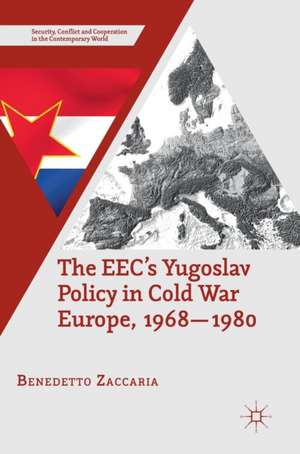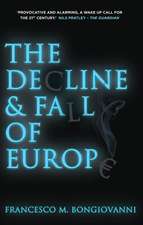The EEC’s Yugoslav Policy in Cold War Europe, 1968-1980: Security, Conflict and Cooperation in the Contemporary World
Autor Benedetto Zaccariaen Limba Engleză Hardback – 23 iun 2016
| Toate formatele și edițiile | Preț | Express |
|---|---|---|
| Paperback (1) | 473.35 lei 6-8 săpt. | |
| Palgrave Macmillan UK – 20 apr 2021 | 473.35 lei 6-8 săpt. | |
| Hardback (1) | 635.34 lei 6-8 săpt. | |
| Palgrave Macmillan UK – 23 iun 2016 | 635.34 lei 6-8 săpt. |
Din seria Security, Conflict and Cooperation in the Contemporary World
- 20%
 Preț: 689.79 lei
Preț: 689.79 lei - 20%
 Preț: 629.09 lei
Preț: 629.09 lei -
 Preț: 383.78 lei
Preț: 383.78 lei - 15%
 Preț: 524.11 lei
Preț: 524.11 lei - 18%
 Preț: 762.08 lei
Preț: 762.08 lei - 18%
 Preț: 779.64 lei
Preț: 779.64 lei - 15%
 Preț: 580.14 lei
Preț: 580.14 lei - 15%
 Preț: 688.15 lei
Preț: 688.15 lei - 18%
 Preț: 885.38 lei
Preț: 885.38 lei -
 Preț: 383.01 lei
Preț: 383.01 lei - 15%
 Preț: 463.75 lei
Preț: 463.75 lei - 15%
 Preț: 633.55 lei
Preț: 633.55 lei -
 Preț: 378.43 lei
Preț: 378.43 lei -
 Preț: 473.35 lei
Preț: 473.35 lei -
 Preț: 381.28 lei
Preț: 381.28 lei -
 Preț: 376.71 lei
Preț: 376.71 lei -
 Preț: 385.06 lei
Preț: 385.06 lei - 18%
 Preț: 772.73 lei
Preț: 772.73 lei - 15%
 Preț: 634.06 lei
Preț: 634.06 lei - 15%
 Preț: 634.66 lei
Preț: 634.66 lei -
 Preț: 384.10 lei
Preț: 384.10 lei -
 Preț: 378.80 lei
Preț: 378.80 lei - 15%
 Preț: 633.87 lei
Preț: 633.87 lei -
 Preț: 374.25 lei
Preț: 374.25 lei - 15%
 Preț: 582.25 lei
Preț: 582.25 lei -
 Preț: 376.93 lei
Preț: 376.93 lei - 18%
 Preț: 718.79 lei
Preț: 718.79 lei - 18%
 Preț: 885.22 lei
Preț: 885.22 lei - 15%
 Preț: 687.99 lei
Preț: 687.99 lei - 15%
 Preț: 698.03 lei
Preț: 698.03 lei - 15%
 Preț: 583.85 lei
Preț: 583.85 lei -
 Preț: 383.99 lei
Preț: 383.99 lei - 18%
 Preț: 780.56 lei
Preț: 780.56 lei -
 Preț: 384.10 lei
Preț: 384.10 lei
Preț: 635.34 lei
Preț vechi: 747.46 lei
-15% Nou
Puncte Express: 953
Preț estimativ în valută:
121.63€ • 125.09$ • 100.90£
121.63€ • 125.09$ • 100.90£
Carte tipărită la comandă
Livrare economică 20 februarie-06 martie
Preluare comenzi: 021 569.72.76
Specificații
ISBN-13: 9781137579775
ISBN-10: 1137579773
Pagini: 198
Ilustrații: XII, 208 p.
Dimensiuni: 148 x 210 x 18 mm
Greutate: 0.41 kg
Ediția:1st ed. 2016
Editura: Palgrave Macmillan UK
Colecția Palgrave Macmillan
Seria Security, Conflict and Cooperation in the Contemporary World
Locul publicării:London, United Kingdom
ISBN-10: 1137579773
Pagini: 198
Ilustrații: XII, 208 p.
Dimensiuni: 148 x 210 x 18 mm
Greutate: 0.41 kg
Ediția:1st ed. 2016
Editura: Palgrave Macmillan UK
Colecția Palgrave Macmillan
Seria Security, Conflict and Cooperation in the Contemporary World
Locul publicării:London, United Kingdom
Cuprins
Introduction. - 1. The Path to the First Trade Agreement. - 2. The 1973 Agreement. - 3. Beyond Trade Stagnation. - 4. The Making of the 1976 Joint Declaration. - 5. As close as Possible to the EEC
Notă biografică
Benedetto Zaccaria is Research Assistant at the Alcide De Gasperi Research Centre of the European University Institute, Italy.
Textul de pe ultima copertă
The disintegration of Yugoslavia in the early 1990s is often described as the starting-point of the EEC/EU involvement in Western Balkan politics, as if no political relations had developed between the EEC and Yugoslavia during the Cold War era. Instead, this book shows that the origin of EEC-Yugoslav relations must be placed in the crucial decade of the 1970s. Contrary to received opinion, this work demonstrates that relations between the EEC and Yugoslavia were grounded on a strong political rationale which was closely linked to the evolution of the Cold War in Europe and the Mediterranean. The main argument is that relations between the two parties were primarily influenced by the need to prevent the expansion of Soviet influence in the Balkans and to foster détente in Europe.
Caracteristici
Focuses on the relationship between the European Economic Community (EEC) and Yugoslavia in the crucial decade of the 1970s Demonstrates that relations between the EEC and Yugoslavia were grounded on a political rationale linked to the evolution of the Cold War in Europe and the Mediterranean Offers important contributions in the fields of the Cold War, European Integration History, History of Yugoslavia and Balkan International Affairs
















